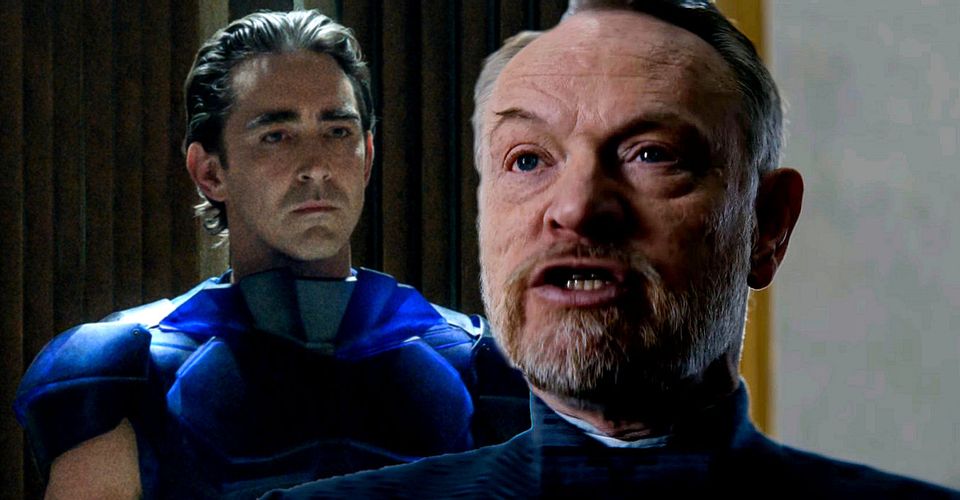Foundation: The Empire Falls Because Of Hari’s Prediction – Theory Explained

Hari Seldon may well have engineered the beginning of the Empire’s fall in Foundation season 1. Inspired by the famous novels of Isaac Asimov, Apple TV+’s Foundation series has transformed them into a powerful drama in which one man battles to save the future of all civilization. Asimov’s books and short stories are relatively concept-driven, but showrunner David Goyer has heavily adapted them to suit the television format. He’s transformed Foundation into a chess game between two grandmasters.
On the one side of the board, there is the Emperor Cleon. The Cleons have established what Goyer has described as a “genetic dynasty,” where there is only one emperor, cloned and brought up by his predecessors. The Emperor embodies the Imperial philosophy that it will last forever, for he considers himself constant and unchanging, and he will go to any lengths to maintain his rule. The other player is Hari Seldon, who has mastered a mathematical science called psychohistory that allows him to predict the future. Seldon has realized even the Empire cannot endure, and it will ultimately fall to be followed by a galactic dark age. He has dedicated himself to adjusting events so the dark age that falls across the galaxy lasts only one thousand years, and he is willing to sacrifice even his own life in the cause of this pursuit.
And so the stage is set for Foundation, a clash of wills between an Emperor who resists change and a mathematician who seeks to control it. The first two episodes essentially show some of the opening gambits, but they conceal as much as they reveal. And they raise the fascinating possibility that Hari Seldon is himself the architect of the Empire’s downfall.
Hari Seldon’s Psychohistory Has Changed The Empire

Hari Seldon’s psychohistory is a science so advanced it has so far been understood by only two characters in Foundation. It appears to be an unimaginably complex model that was constructed based on past events, and has been tested against ones in the present day in order to validate it. Apparently Seldon has found it convincing, for – the tests complete – he has looked forward across the millennia to predict the fall of empires. His prophecies are strikingly specific – of conflict on the galactic rim, of religious movements opposing the Cleons on a philosophical level, of uprisings on the galactic capital of Trantor itself. But rather than simply sit back and watch the future unfold, Hari has set in motion a carefully engineered plan to accelerate the Empire’s fall in order to restore it and end the galactic dark ages more quickly.
The first step appears to have been to amass a following by making his predictions public knowledge. On the face of it, this seems to have been focused mainly on gaining enough followers to make his Foundation possible, but it has another – far darker – purpose. Seldon has introduced a new idea into the Empire – the concept of impermanence, the fear that even the Empire can fall. For the Cleons, this manifests as a growing fear that events could actually spiral out of their control, and when there is a terrorist attack on Trantor their fear and insecurity leads them to overstep – creating just the kind of instability on the galactic rim that Seldon foretold. Meanwhile, the citizens of the Empire have now heard of a scientist who foretold doom and seemed to be feared by the Emperor himself, and for the first time they have doubts about the Empire. As the years pass, Hari’s prophecies of doom will exert a philosophical force as irresistible as the gravitational pull of a black hole; every time something happens, people will assume it fits with Hari’s psychohistoric predictions, even if it does not actually do so. Hari has made the Empire vulnerable on a psychological level.
Hari Seldom May Even Have Orchestrated the Star-Bridge Collapse

All this raises the disturbing question; just how far did Hari Seldon go to shape the future? The first two episodes of the Apple TV+ show see Trantor rocked by suicide bombers who literally kill millions, and whose actions appear tied to warlike planets on the galactic rim. The timing of these terrorist attacks seems perfectly timed for Hari Seldon, because suddenly his psychohistory feels a lot more real to the Emperor and to the citizens of Trantor, for they all feel a sudden surge of vulnerability. It is no exaggeration to say the attacks provide the impetus for the establishment of the Foundation itself, although in an ironic twist Hari had expected himself to be executed rather than to be part of the mission to Terminus.
But, although the Empire launch fierce reprisals on the worlds the Emperor blames for the suicide bombings, they are unable to identify a clear money trail. It is possible Hari Seldon himself engineered the attacks, which took place at the exact moment he needed them to, right down to happening just after Gaal Dornick – who he knew he needed – had arrived on Trantor. What is more, when speaking to Gaal the psychohistorian gave her a paper from the library, telling her it didn’t matter because everything there would soon burn. Again, it was a remarkably specific prophecy, fulfilled the moment the Sky Bridge came crashing down on to Trantor. It really does feel as though Hari knew exactly what was coming, and indeed as though he had engineered it.
If this theory is correct, then Hari Seldon’s opening moves in his grand game against the Emperor have been more subtle and effective than anyone believes – and, disturbingly, they have come at great loss of life. No doubt Hari would justify his actions by pointing to everything he is trying to achieve; he truly believes the fall of the Empire is inevitable, and his purpose is to control its descent into the dark ages in order to ensure civilization returns more quickly than would otherwise be the case. Such an “ends justify the means” philosophy is dark indeed, coming at the cost of millions of lives, and it positions both of the players in Foundation as sinister forces in their own right.
About The Author


















